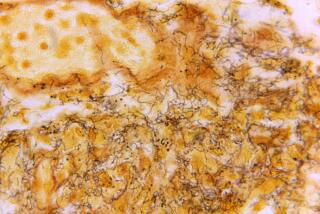Top U.S. Health Aide Declares That AIDS Is ‘Difficult to Catch’
- Share via
WASHINGTON — Federal public health officials, decrying what they described as an epidemic of fear over the growing incidence of AIDS, said Thursday that there was no need for Americans to feel helpless against the disease and said people could take effective steps to keep from contracting it.
“I can say with assurance that AIDS is not easy to catch--it is an extremely difficult disease to catch,” Dr. James O. Mason, acting assistant secretary of health and human services, said at a news conference. “It is not spread by casual contact with risk-group members or with AIDS patients.
“People from all walks of life feel threatened by AIDS, and they feel helpless in the face of an almost universally fatal disease,” he added, saying this feeling “is absolutely unnecessary and counterproductive. It does not help the people who have already become ill with AIDS.”
Mason said the proportion of cases of acquired immune deficiency syndrome in the United States among heterosexuals continues to be only 1% of the total reported.
“These cases in heterosexuals were transmitted by sexual contact with a risk-group member or an AIDS patient of the opposite sex,” Mason said. “The proportion of AIDS cases in this heterosexual category has not changed in the past few years. Most had sexual contact with IV (intravenous) drug abusers.”
Behavior Changes
Mason, who was accompanied by Dr. Walter Dowdle of the Centers for Disease Control and Dr. Anthony Fauci of the National Institutes of Health, recommended behavior changes that he said would reduce the chances of exposure to the virus that causes AIDS.
“The changes are worth making,” Mason said. “Were they implemented, we could stop transmission of this disease today.”
He said sexually active people should avoid sexual intercourse with members of AIDS risk groups--which include male homosexuals, bisexuals and intravenous drug users--or with anyone who is a sexual partner of risk-group members. They should also avoid sexual contact with anyone whose blood has tested positive for AIDS antibodies.
“People should remember, too, that the greater the number of sexual partners, the greater the risk of contracting AIDS,” he said. “Although we are not certain that the consistent use of condoms will reduce the possibilities of infection, it’s a common-sense recommendation that people having sex with a risk individual should consider. In addition, sexual practices that cause injury to tissue--anal intercourse, and so on--should be avoided.”
Mason also urged Americans to refrain from using intravenous drugs and “if you do, do not share needles.” Also, he said, because AIDS can be transmitted to an unborn child from an infected mother, “women who are sex partners of risk groups members or who use IV drugs should consider the risk to their babies before pregnancy.”
No Family, Health Care Cases
Emphasizing that “we have solid scientific evidence on transmission methods,” Mason said studies have shown no cases of the disease being passed among family members or other household members of AIDS victims, or among health care workers who treat them.
AIDS is an incurable, fatal disease caused by a virus known as HTLV-III that destroys the body’s immune system, leaving it vulnerable to otherwise rare infections.
As of Monday, there had been 13,228 reported cases in the United States and 6,758 deaths.
It is transmitted through sexual contact--by exchange of bodily fluids such as semen and blood--and through sharing unsterilized hypodermic needles. It had also been spread through transfusions of contaminated blood or blood products but a blood screening test that detects AIDS antibodies has since eliminated that danger.
Those at highest risk include male homosexuals and bisexuals, intravenous drug users and their steady sexual partners.
Not a ‘Homosexual Disease’
Fauci, however, emphasized that AIDS is not a “homosexual disease,” but one caused by a virus “that happened to have been introduced into the homosexual population,” where it spread.
“Whoever labeled it a homosexual disease was labeling it incorrectly,” he said.
The CDC, in a report released Thursday, said there have been 133 cases of AIDS caused by heterosexual contact. The majority of these victims said they had had sexual contact with intravenous drug users. The agency also said there have been 829 cases where no known risk factors have been identified. Of these, the agency said, 344 of the victims were born in developing countries where AIDS is known to exist, and 23 were men who reported sexual contact with female prostitutes.
Although transmission from heterosexual men to their female sexual partners has been “well established,” the agency said, female-to-male sexual transmission in the United States has been “less evident.” However, Mason said, “we must assume such transmission does occur.”
More to Read
Sign up for Essential California
The most important California stories and recommendations in your inbox every morning.
You may occasionally receive promotional content from the Los Angeles Times.













